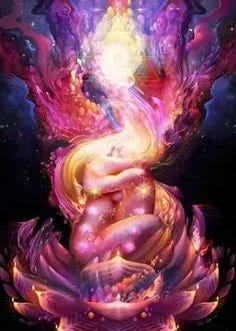Is "eros" safe?
Positioning Ourselves Responsibly Relative to Eroticized Wisdom Teachings
Q: Is “eros” a safe concept for wisdom-development?
………..(Headnote: Eros plays an important role in the new online course starting in April. )
A laudably scintillating and responsible question. Thank you.
Logos of Eros
Eros is an ancient Greek “word” (semi-ironic quotation marks) that played an important role in the spiritual discernment of ancient Mediterranean adepts, sages & priestesses. Their remarkable ideas crystallized into written language (against the objections of people like Socrates) which then informed some of the more complex Christian theologians.
During the the period of the European Renaissance, this Greco-Christian concept of eros found resonances with the coded sexualized metaphors of Jewish mysticism as well as with various streams of Tantric Buddhism and Hinduism which continued to flow into Europe from the East. This fertile intermingling produced the emphasis on eros in many subsequent occult and alchemical lineages.
Those same sources also made this concept attractive to those early psychoanalysts (Sigmund Freud famously paired eros & thanatos as fundamental psychic drives) who were brashly attempting to map the unsociable depths of the organismic psyche.
And then, for the last half century (or more) this term has played a significant role in the emerging domain of transpersonal, evolutionary & integrative metaphilosophies.
But enough linguistic genealogy! Why on Earth do people use this word?
Love?
The legendary Eskimos (as opposed to the real Inuit peoples) supposedly had an ungodly number of words for “snow.” Modern citizens have barely two or three words for something as profound as “love.” Our tragic linguistic poverty is one of the reasons that we hearken back to ancient terminology to assist the growth of our more nuanced and enriched understandings.
Among the Greek philosophers and early Christian theologians of antiquity, eros was a crucial part of their general scheme to tease apart different kinds of love.
Eros, for example, is NOT deep friendship. It is not comradeship. It is not parental affection for offspring or philosophical fellowship or a generalized altruistic spirit of compassionate well-wishing. Nor is it the already-given, all-embracing Divine love known as “Agape.” Obviously! Eros is more erotic…
Eros is a very specific species of love that is entangled with carnal and personal qualities. It is an amplification and clarification of the pleasure motives and aesthetic allurements that are connected to reproduction. And reproduction has numerous variants. Of course there is the well-known physical reproduction into genetic offspring that has evolved a neuronal chemistry of quasi-obsessional “mating season” affects. That’s a good one… but it does not exhaust the category. There is also the reproduction of the imaginative faculty into art and invention. And the reproduction of colonized community space through an intrepid exploration of the enticing wilderness.
Perhaps it even includes the reproduction of consciousness into an additional fiery astral, virtual or energetic second inner body.
Eros is the generic drive to converge, merge & emerge.
We can see how attractive this type of attractiveness must seem to contemporary adherents of “evolutionary spirituality” and “developmental philosophy.” It seems quite well-placed to garner the attention of those starry-eyed souls who are interested in the lively relational production of leading-edge noetic experiences and emergent culture. And these are among my favorite sorts of people.
So eros is a whole suite of ways in which we can be turned on by some intriguing Other. Another entity, idea or condition — uniquely signaled to us through the arousal of an additional affirmational (and often risky) feeling quality — that draws us toward the potential of a novel generative convergence.
Okay. That’s the concept. Sounds pretty good. But doesn’t it still have a wiggly bit of hippie cringe to it?
Hippie Cringe
Which kinds of people want to tell us about the “erotic” nature of spiritual and existential reality? That seems a little sus, right? As plausible as we may find the philosophical history of this word, we must not forget that many cults and irresponsibly degenerative interpersonal tangles have occurred down pathways that began with a positive affirmation of the erotic dimension of the cosmos.
(Let us remember that wariness is not foolish and usually has something to teach us.)
Experiments in being more erotically forthright have occurred periodically throughout history. In particular, they have flourished in Europe and North America since the 1960s. And they are deeply ambiguous.
If your culture contains numerous unnecessary forms of sexual repression, pathological shame & perversity-masquerading-as-normalcy, then it is very important for people to take risks to explore the ways that archaic organic arousals can be liberated toward alternative social patterns.
However, if your culture is already fairly healthy and open-minded, then retro-romantic rebellion, undisciplined urges & weaponized combinations of anxiety and desire are easily coopted to mislead people into degrading power-schemes and new traumas concealed behind a rhetoric of open-mindedness, self-challenge and sex-positivity.
The question is: which situation are you in?
And the answer is not always clear. Especially as we drift further and further into an epoch in which sex is uncoupled from reproductive habits and sexual anatomy itself can be technologically remade.
When the philosophical concept of eros is used to focus our attention more responsibly on the generative potential of hedonic allurement & the need to development more nuanced approaches to multidimensional interactivity, then it may be very good. Even necessary. But if our encouragement, self-esteem and “freedom feelings,” around sexualized behavior can lead us away from integrity — perhaps under the guise of the all-pervasive cosmic fuckability — then we should be more vigilant about people who casually justify themselves with these concepts.
Thusly we are called upon to be both sympathetically intrigued by & suspiciously critical of the proponents of a more pro-erotic way of being-in-the-world.
In fact, the mere fact that “sex sells” should put us on guard in these matters:
The Risk of Phraseological Leakage
Although the word “eros” was anciently used to distinguish a very specific form of love, there is a tendency for mystics and evolutionary philosophers today to expand it into an all-purpose concept. What are the harms or benefits from suggesting that all interactions are erotic?
There are some very interesting nuances here. Subtle differences come into play. It is similar to the way that the assertion I AM GOD is distinct from, and a little bit more worrying than, saying GOD IS EVERYTHING INCLUDING MY SELF.
Similarly, the recognition that a common “energy” flows in all things including our root chakras (sexual systems) is slightly different than asserting that everything is sexual. While there is degree of truth in the latter assertion, it is also at high risk of imbalance. There is danger in collapsing the general category into the flavor and behavioral profile of the specific instance.
That risk of imbalance, of course, is proportional to how good we are at balancing! Maybe you’re great at it. However, most of us exaggerate (even to ourselves) our capacity. So for people in general there is likely to be some risk involved into using a “special part” to represent the Whole.
For example:
There are internal energy practices that become available when we frame our phenomenological experience of reality in terms of all things being potentially nourishing. Everything is food. Okay, great. But bacon is food. And if I say that everything is bacon, then I have made a suggestion whose particular flavor is tied to a highly motivated set of preconscious impulses in the human brain.
Mmmmmm…. bacon.
Eroticism is so deeply connected to our unconscious neurogenetic drives and our deep forms of emotional psychology, that we should expect a high likelihood that hidden, unwise tactical manipulations are occurring in the psyche even in situations of apparent benevolence.
Now, if we had…
strong, evolving and responsible self-awareness of hidden motives in ourselves and others
high capacity for self-regulation
relentless ability to prevent the values of one situation from forgetting our other values
a potent embrace of the “feminine” — including a validation of it’s many sensitivities and strange corners
a new valorize of healthy masculinity
a deep commitment to and capacity for the quivering ambiguity of interactive threshold spaces in general
… then we would probably be fine. Under those conditions, we could feel pretty secure about the philosophy of eros. But until that becomes the normal condition, we may face some real problems with the erotic phrasing.
Here’s one notorious problem:
If you constantly have to explain to people that “Eros isn’t just sex,” or “Tantra isn’t just sex,” then maybe you’re using the wrong word!
When Dr. Wilhelm Reich (father of the Sexual Revolution) spoke of Orgone, Orgasm Reflexes & Orgasmic Capacity he meant something much more profound and multidimensional than the casual climax of a conventional human mating event. Yet the very fact of that he used such phrasing meant that most people were definitely going to connect it directly to their own sexual lives, sexual anxieties and sexual hopes. The phrasing itself leaks into misleading domains. There is incentive for it to do so.
On the other hand, perhaps there are many situations in which this provocative ambiguity is precisely what people need!
Maybe the casual and philosophical use of concepts that make people unnecessarily activate their mixed feelings about sexuality is a tremendously useful way of eliciting subconscious material, challenging uninspected affective habits & opening people to a more full-spectrum future for human well-being at all levels?
Maybe.
Yet even if the misleading capacity of erotic phrasing is potentially useful, we still need a good theory and practice about when/where & with whom this effect is likely to be benevolent.
Where do we face a situation in which the error is on the side of those who unnecessarily project sexualization? Conversely, where are we facing a situation in which the error is on the side of the sexualizers? There is no quick universal answer but we can at least begin to be sensitive to the mixture of qualities that are baked into these terms:
We diunital/integrative/metamodern hordes of feeler-thinkers (I’m including you in that group) have got to be playing across both these sandboxes. It is, for example, not without merit that conservatives accuse liberals of watching a disturbingly large number of shows featuring harmful, nihilistic forms of teen sex. Nor are they incorrect to point out that some very prominent “progressive, postmodern” philosophers have tried to do away with age-of-consent laws in a way that borders uncomfortably on pedophilia and rape-tolerance. Worrying.
But it’s not the only worrying thing.
Clearly a lot of so-called “traditional families and social codes” are overtly toxic, life-denying, uselessly suppressive & unable to distinguish between health & obedience. And just as clearly these represent a dangerously entrenched cultural power structure that inhibits many forms of legitimate well-being. So the ongoing sexual revolution made famous in the 1960s must continue its laudable attempt to loosen, mobilize and liberate emotional bodies from perversely conformist social routines.
The good fight is not over. Those hysterical fainting fads produced by Elvis’s pelvic gyrations in the early 1960s continued into Kevin Bacon’s 1980s war for aroused dancing in the small town America of Footloose. And the authentically liberating aspects of that crusade must still be encouraged into the future...
(Or, if you would rather David Lynch had directed the original Footloose:)
So the point here — playfully resonant with certain themes of the so-called Culture Wars — is that we must be able to conceive, validate and tease apart both the dangerous and laudable aspects of the erotic phraseology of wisdom and spirit.
If we are simply for-or-against eros, then we probably are not even thinking yet.
Tantra, Sutra & Responsibility
It is historically common to divide human communities into esoteric and exoteric domains.
While some highly sensitive, uber-mimetic, integrative & daring experimentalists attempt to elicit Dharma from within the transfiguration of all human energies, the main bulk of the population still requires healthy, empowering limits and ritual affordances — upon which they cannot spend much of their precious time and energy testing & pondering.
There is an organic division of labor anchored in neurodiversity and genetics. One person falls asleep after a cup of coffee while another is forced to stay up all night. Not all villagers should do what the ‘shamans’ are doing — and vice versa!
This ancient distinction is often invoked in consideration of the eroticized approach to developmental training. It becomes very tidy to suggest that perhaps the erotic (and all ambiguous intensities) should be promoted among the prepared & competent explorer class while presenting those ideas more cautiously and perhaps only minimally to the general population of hard-working breeders.
Is this distinction too tidy?
Today we cannot be entirely sure what “natural” sexuality looks like compared to “historically normal” sexuality. The degree to which our inherited traditions and common instincts represent what is healthy is simply not known. And does it change under different historical, social, genetic and technological conditions? How radically might the appropriate norms of the emerging civilization need to differ from those documented over the last 6000 years?
One could make the case — though it is not necessarily correct — that much of the behavior previously quarantined among the Tantrics should actually be the normal general approach for the human future. Perhaps being a normal, obedient ,ritual participant in Sutra wisdom could become a rare specialization.
Precisely because we do not know answers like these, we must simultaneously affirm
(a) a social membrane or boundary of distinction, and
(b) an ongoing creative negotiation about what passes back and forth across that boundary.
The goal for such simultaneous discrimination-and-sharing is to produce a healthy, stable & flourishing multidimensional community. Whatever form this evolves into, in the emerging epoch of planetary bio-informational civilization, it will nonetheless need to emphasize responsibility.
Whether we feel called to emphasize or deemphasize the concept of eros in our cosmology and communication, we are all collectively required to figure out how to behave in ways that serve rather than undermine others, selves and systems.
Whatever our shamans, witches & Tantric adepts are doing, they must do it such as to to cultivate general coherence and reliability for themselves, each other and the community generally.
Even if we are moved to the sense that risk, antifragility and the provocative edges of experience are highly useful, we must still do this in ways that minimize the triggering of others, prevent trauma, honor those we care for & evade the unconscious leakage that tends to cause pro-erotic wisdom discourse to slide dangerously toward regressive pockets of indulgent and cultic entanglement.







“While some highly sensitive, uber-mimetic, integrative & daring experimentalists attempt to elicit Dharma from within the transfiguration of all human energies,”.... would you be able to point me in the direction of any of these creatures?